10 Best Law Schools In Florida
The best law schools in Florida are distinguished by their commitment to excellence in legal education, offering students a comprehensive and immersive experience. Florida, known for its vibrant culture, diverse population, and expansive coastline, is a distinguished hub for legal education in the United States. The state boasts a variety of law schools, each with unique strengths, specialties, and contributions to the legal community. Prospective students have various options catering to different interests, career goals, and academic preferences when considering the best law schools in Florida. The selection showcases the top law schools in Florida, renowned for their rigorous academic programs, distinguished faculty, and robust practical training and professional development opportunities.
These institutions have state-of-the-art facilities, extensive libraries, and opportunities for hands-on learning through clinics, internships, and moot court competitions. Students at these schools benefit from a supportive academic environment, fostering collaboration and mentorship among peers and faculty. The diverse legal landscapes of Florida provide a dynamic backdrop for studying law, offering students insights into various areas of practice, from environmental and maritime law to international law and human rights.
Top Florida Law Schools At A Glance
| Law School | Location | Accreditation | Acceptance Rate | Average LSAT Score | Average GPA | Program Length | Tuition Costs (Per Year) | Flexible Scheduling | Student-Faculty Ratio | Bar Passage Rate | Employment Rate Post-Graduation |
|---|---|---|---|---|---|---|---|---|---|---|---|
| St. Thomas University School Of Law | Miami Gardens, FL | ABA | 50.20% | 150 | 3.42 | 3 years | $46,200 | Yes | 10.5:1 | 60.40% | 78.50% |
| Ave Maria School of Law | Naples, Florida | ABA | 43.70% | 152 | 3.35 | 3 years | $49,656 | Yes | 9.9:1 | 66.20% | 87.70% |
| University of Florida Levin College of Law | Gainesville, Florida | ABA | 16.90% | 169 | 3.91 | 3 years | $22,194 (in-state), $38,430 (out-of-state) | No | 4.8:1 | 76.80% | 95.40% |
| University of Miami School of Law | Coral Gables, Florida | ABA | 33.50% | 162 | 3.72 | 3 years | $63,506 | Yes | 6.4:1 | 69.80% | 83.80% |
| Stetson University College of Law | Gulfport, Florida | ABA | 31.00% | 158 | 3.59 | 3 years and part-time options | $51,212 (full-time), $33,680 (part-time) | Yes | 9.3:1 | 64.80% | 89.60% |
| Florida International University College of Law | Miami, Florida | ABA | 23% | 160 | 3.74 | 3 years and part-time options | $21,115 (in-state), $34,900 (out-of-state); part-time: $15,936 (in-state), $26,275 (out-of-state) | Yes | 7.4:1 | 80.30% | 86.20% |
| Barry University School of Law | East Colonial Drive, FL | ABA | 53.80% | 149 | 3.24 | 3 years | $43,150 (full-time), $32,826 (part-time) | Yes | 17.1:1 | 49.40% | 66.90% |
| Florida State University College of Law | Tallahassee, FL | ABA | 19.60% | 165 | 3.85 | 3 years | $20,693 (in-state), $40,705 (out-of-state) | Yes | 6.1:1 | 77.20% | 95.80% |
| Florida A&M University College Of Law | Orlando, Florida | ABA | 35.40% | 151 | 3.52 | 3 years | $13,816 (in-state), $33,077 (out-state) | Yes | 8.3:1 | 53.60% | 65.80% |
| Nova Southeastern University Shepard Broad College of Law | Fort Lauderdale, Florida | ABA | 55.10% | 153 | 3.36 | 3 years and part-time options | $46,197 (full-time), $35,051 (part-time) | Yes | 10.4:1 | 55.40% | 64.50% |
The top 10 Best Law Schools in Florida are listed below.
- St. Thomas University School of Law: St. Thomas University School of Law is known for its strong focus on social justice and public service. It offers students a nurturing environment to pursue their legal education with a purpose.
- Ave Maria School of Law: Ave Maria prepares students for ethical practice in various legal fields and is committed to providing a comprehensive legal education informed by the Catholic intellectual tradition.
- University of Florida Levin College of Law: UF Levin College of Law boasts a rich tradition of excellence as one of the flagship law schools in the state, offering a broad range of programs and a vibrant legal community.
- University of Miami School of Law: The University of Miami School of Law provides students with a unique perspective on international and domestic law in a global city, enhanced by its diverse faculty and student body.
- Stetson University College of Law: Stetson University College of Law equips students with exceptional litigation and dispute resolution skills, preparing them for success in the courtroom and beyond, renowned for its advocacy program.
- Florida International University College of Law: FIU College of Law stands out for its comprehensive legal education and focus on global legal issues. It serves as a gateway for international law careers.
- Barry University School of Law: Barry Law fosters a close-knit community where students are encouraged to pursue justice and public service, supported by a curriculum emphasizing ethics and practical skills.
- Florida State University College of Law: FSU College of Law prepares students for impactful careers in the public and private sectors with a strong emphasis on government service and public policy.
- Florida A&M University College of Law: FAMU College of Law is committed to increasing diversity in the legal profession, offering an inclusive environment where students from all backgrounds thrive.
- Nova Southeastern University College of Law: NSU College of Law is known for its innovative programs and focus on technology in the law, preparing students for the evolving landscape of the legal profession.
Table of Contents
- 1. St. Thomas University School Of Law
- 2. Ave Maria School Of Law
- 3. University Of Florida Levin College Of Law
- 4. University Of Miami School Of Law
- 5. Stetson University College Of Law
- 6. Florida International University College Of Law
- 7. Barry University School Of Law
- 8. Florida State University College Of Law
- 9. Florida A&M University College Of Law
- 10. Nova Southeastern University College Of Law
- How To Choose A Law School In Florida?
- Academic Experience At Florida Law Schools
- Core Courses And Foundational Curriculum
- Specialization Options (Environmental, Health, And International Law)
- Clinical Programs, Externships, And Local Internship Opportunities
- How Much Does Law School In Florida cost?
- What Are The Admission Requirements For Law Schools In Florida?
- What Is The Easiest Law School To Get Into In Florida?
- What Is The Hardest Law Degree To Get?
- What Are The Advantages Of Getting Into Law School In Florida?
- What Are The Disadvantages Of Getting Into Law School In Florida?
- Student Life In Florida Law Schools
- Housing Options And Cost Of Living Considerations
- Balancing Academics And Extracurricular Activities
- Is Getting Into Law School In Florida Worth It?
- How Competitive Is The Job Market For Florida Law Graduates?
- Is It Hard To Get Into Law School In Florida?
- Are Florida Law Schools Better Than Law Schools In Georgia?
1. St. Thomas University School Of Law
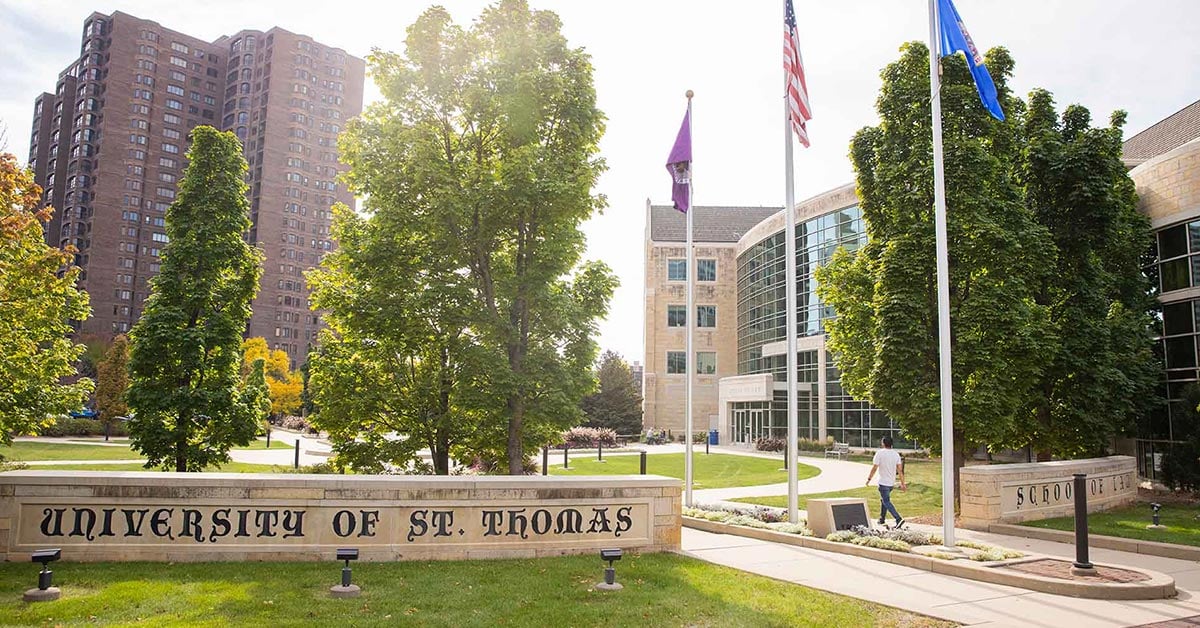
St. Thomas University School of Law, located in Miami Gardens, Florida, is a private institution known for its commitment to social justice and ethical practice in the legal profession. The law school is part of St. Thomas University, a Catholic university emphasizing a values-based education established in 1984. The campus’s address at 16401 NW 37th Avenue, Miami Gardens, offers students the advantage of studying law in a vibrant, diverse metropolitan area with many professional opportunities.
St. Thomas University School of Law’s acceptance rate is 50.2%. The acceptance rate at St. Thomas University School of Law reflects its selective admissions process, aiming to enroll students who demonstrate strong academic and professional promise and a commitment to the school’s mission. The law school looks for applicants with competitive LSAT scores and GPAs, with an LSAT score of 150 and a median GPA of 3.42. The LSAT and GPA requirements indicate the school’s commitment to academic excellence. However, St. Thomas considers a range of factors in its holistic review of applicants, including personal statements, letters of recommendation, and experiences that align with its mission.
The Bar Exam Passage Rate of St. Thomas University School of Law is 50%. The Bar Exam Passage Rate is an essential metric for prospective students, as it reflects the effectiveness of the law school’s curriculum in preparing graduates for legal practice. St. Thomas University School of Law has made strides in improving its bar passage rate, offering various programs and resources to support students in the critical aspect of their legal education.
St. Thomas University School of Law offers a range of law degrees, including the Juris Doctor (JD), joint degrees such as the JD/MBA (Master of Business Administration), and LL.M. (Master of Laws) programs. These programs are for U.S. and internationally trained lawyers looking to specialize or enhance their legal education. These programs cater to diverse career goals, from traditional legal practice to roles in business, public service, and international law.
Tuition fees at St. Thomas University School of Law align with its private status and the quality of education it provides. Tuition rates are subject to change, but the school is committed to making legal education accessible to qualified students through financial aid, scholarships, and other funding opportunities. Prospective students are encouraged to review the most current tuition information on the law school’s website and explore financial aid options to support their studies.
St. Thomas University School of Law offers a comprehensive legal education grounded in ethical practice and social justice. It presents a compelling option for prospective law students in Florida with its selective admissions, diverse degree offerings, and supportive environment for bar exam preparation.
2. Ave Maria School Of Law
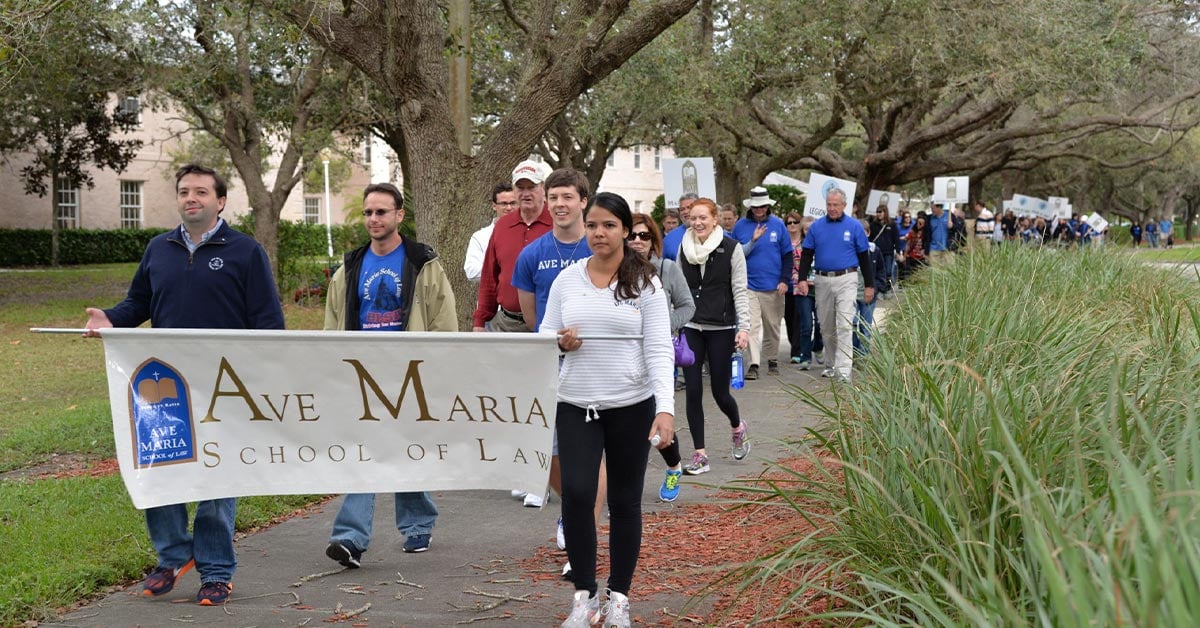
Ave Maria School of Law is a private Catholic law school that stands out for its dedication to providing a rigorous legal education infused with moral and ethical principles. The founder of Domino’s Pizza and a devout Catholic philanthropist founded in 1999 by Tom Monaghan. The school opened in Ann Arbor, Michigan, before relocating to Naples, Florida, in 2009. The move was part of a strategic initiative to create a cohesive Catholic educational community alongside Ave Maria University. The law school’s campus is now at 1025 Commons Circle, Naples, Florida, offering students a serene and focused environment for their legal studies.
The acceptance rate at Ave Maria School of Law is 43.7%, indicating its selective admissions policy. It aims to identify academically capable students and align with the school’s mission to provide a legal education that integrates the Catholic intellectual tradition. The school consistently seeks applicants who demonstrate the potential for success in law school and their future legal careers, although specific acceptance rates vary yearly. Ave Maria School of Law requires 149 to 155 LSAT scores (25th-75th percentile) and 2.93 to 3.65 GPAs (25th-75th percentile) from applicants, setting competitive thresholds for admission to ensure that students are well-prepared for the rigors of legal study. These requirements underscore the school’s commitment to academic excellence.
A critical measure of a law school’s effectiveness is its Bar Exam Passage Rate, and the Ave Maria School of Law prides itself on preparing students thoroughly for the pivotal examination. The school’s bar passage rate is 63%, which reflects its dedicated faculty, comprehensive curriculum, and supportive resources to ensure students are well-equipped to succeed on the bar exam and in their subsequent legal careers.
Ave Maria offers a Juris Doctor (JD) program designed to prepare students for a wide range of legal careers, emphasizing ethical practice, public service, and a deep understanding of the law domestically and internationally. The school provides opportunities for students to engage in clinical work, internships, and other practical experiences that enhance their legal education.
The full-time tuition fee of the Ave Maria School of Law is $48,156. Tuition fees at Ave Maria School of Law are set to reflect the quality of education and the resources available to students. Ave Maria strives to make legal education accessible through financial aid, scholarships, and other financial resources to assist students in managing the cost of their education as a private institution. Prospective students must consult the school’s website for current tuition rates and financial aid options.
Ave Maria School of Law offers a unique legal education that combines academic rigor with a strong emphasis on the Catholic intellectual tradition and moral ethics. Its beautiful Naples location, selective admissions, dedicated bar exam preparation, and comprehensive JD program make it a noteworthy choice for individuals seeking to pursue a career in law with a foundation in ethical principles.
3. University Of Florida Levin College Of Law
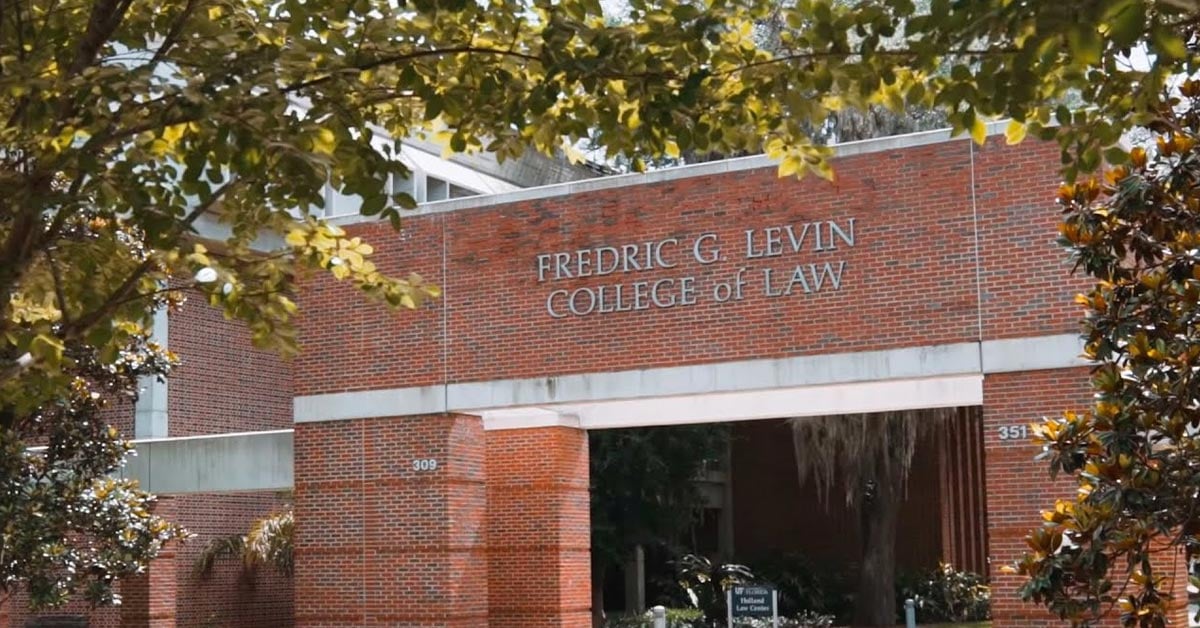
The University of Florida Levin College of Law, a prestigious institution within the state’s higher education system, is renowned for its comprehensive legal education, distinguished faculty, and strong commitment to public service and professional excellence. It is one of the oldest law schools in Florida and holds a significant place in the legal landscape of the United States, founded in 1909. The college is located on the University of Florida’s main campus in Gainesville, Florida, at 309 Village Drive, providing students with a vibrant campus life integrated into a primary research university setting.
The acceptance rate at the University of Florida Levin College of Law is 16.9%. It reflects its status as a competitive institution, attracting high-caliber students nationwide and worldwide. The college seeks applicants who demonstrate academic excellence, leadership, and service within the legal profession. Prospective students are expected to meet rigorous 162 to 170 LSAT and 3.52 to 3.97 GPA requirements, which indicate the college’s high standards for admission. These benchmarks ensure that enrolled students are well-prepared for legal education and professional practice demands.
The bar exam passage rate of the University of Florida Levin College of Law is 82.7%. A vital indicator of the college’s success in preparing its graduates for legal careers is its Bar Exam Passage Rate, which consistently ranks among the highest in the state. The achievement underscores the quality of the college’s curriculum, the effectiveness of its teaching, and the comprehensive preparation students receive for the bar examination and beyond.
The University of Florida Levin College of Law offers a variety of law degrees, including the traditional Juris Doctor (JD) program, as well as several joint degree options. These include the JD/MBA, JD/MPH (Master of Public Health), and JD/PhD, allowing students to tailor their education to their specific interests and career goals. The college provides LLM programs for U.S. and foreign-trained lawyers seeking to specialize or deepen their knowledge in taxation, environmental law, and international law.
Tuition fees at the University of Florida Levin College of Law are competitive, especially for Florida residents, due to its public university status. Its tuition fee for full-time is $21,803 (in-state) and $38,039 (out-of-state). The college is committed to making legal education accessible and offers a range of financial aid options, including scholarships, grants, and loans, to help students finance their education. Out-of-state students find the tuition rates higher but reasonable compared to private institutions, with opportunities for financial assistance and waivers that reduce the cost burden.
The University of Florida Levin College of Law is a leading institution for legal education, known for its rigorous academic programs, commitment to public service, and strong bar exam performance. The University of Florida Levin College of Law was one of the top law schools in the University of Florida law school ranking in the United States. Its comprehensive degree offerings, combined with competitive tuition rates and a supportive campus environment, make it an attractive choice for prospective law students seeking a high-quality legal education.
4. University Of Miami School Of Law
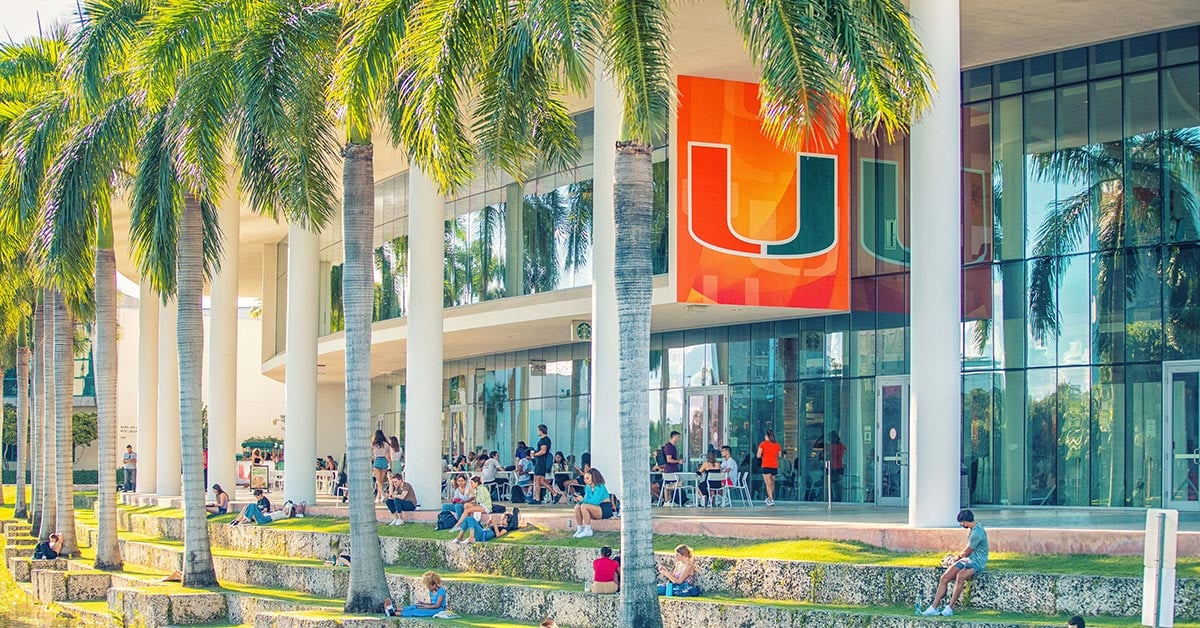
The University of Miami School of Law, situated in Coral Gables, Florida, is a prestigious institution providing quality legal education since its establishment in 1926. The law school is known for its diverse and rigorous academic offerings, fostering an environment where students are encouraged to pursue their interests and prepare for successful careers in various legal fields.
The University of Miami School of Law benefits from its proximity to downtown Miami, a central hub for international law, business, and finance located at 1311 Miller Drive, Coral Gables. The location offers students unparalleled internships, clerkships, and employment post-graduation opportunities in a vibrant and dynamic legal market.
The acceptance rate at the University of Miami School of Law is competitive, which is 33.5%, reflecting its status as a top choice for law students. The school selects applicants who demonstrate academic excellence, professional potential, and a commitment to contributing positively to the legal community, while the exact rate varies yearly.
Admission to the University of Miami School of Law requires applicants to meet 156 to 164 LSAT and 3.45 to 3.81 GPA benchmarks. The school looks for candidates with strong academic credentials, although specific requirements fluctuate. The LSAT and GPA requirements indicate the law school’s commitment to maintaining a high standard of legal education.
The bar exam passage rate of graduates from the University of Miami School of Law is 81.8%, and it is a testament to the quality of its academic programs and the effectiveness of its bar preparation resources. Graduates consistently perform well on the Florida Bar Exam, underscoring the school’s success in preparing students for legal practice.
The University of Miami School of Law offers many law degrees, including the traditional Juris Doctor (JD) program and joint degrees such as JD/MBA and LL.M. programs. The School offers a wide range of programs for individuals looking to specialize in international law, tax law, and entertainment law, among others. These programs are designed to meet students’ diverse needs and interests, equipping them with the knowledge and skills necessary for various legal careers.
Tuition fees at the University of Miami School of Law are $52,562, reflecting its private status and the quality of education it provides. The law school offers financial aid, scholarships, and grants to help students finance their education, while tuition is higher than that of some other institutions. Prospective students are encouraged to review the current tuition information on the law school’s website and explore all available options for financial assistance.
The University of Miami School of Law stands out for its comprehensive legal education, strategic location, competitive admissions, and strong bar passage rates. Offering various degree programs and a commitment to student success, it remains a leading choice for individuals aspiring to pursue a career in law. The University of Miami Law ranking was well-regarded and ranked among the top law schools in the United States by various ranking institutions, including U.S. News & World Report.
5. Stetson University College Of Law
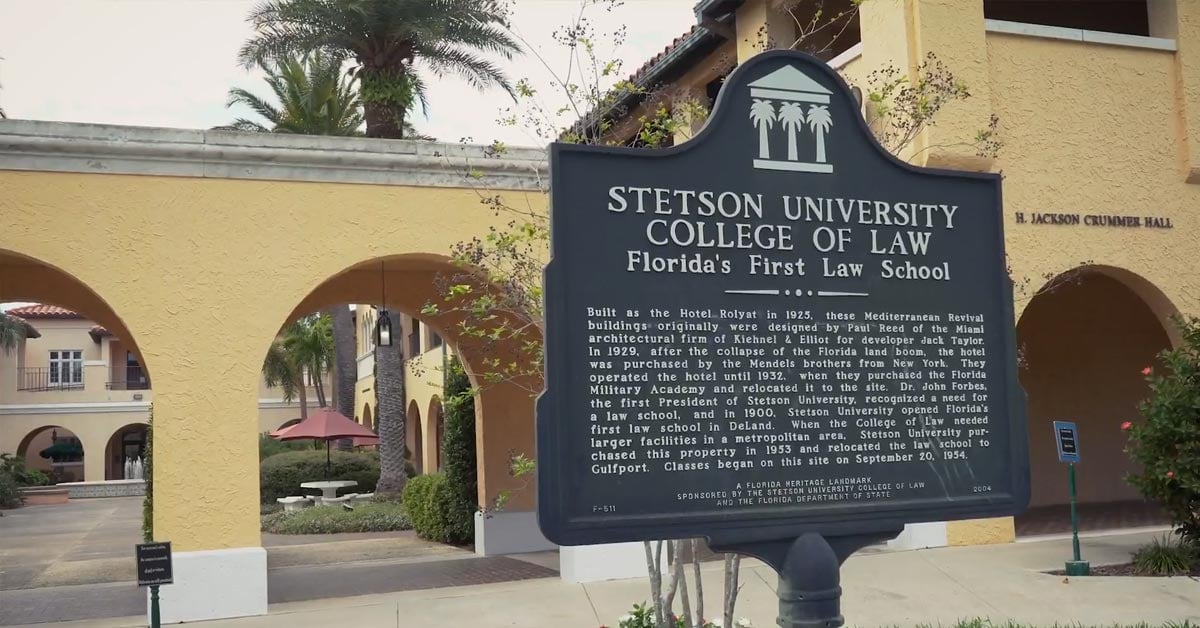
Stetson University College of Law, established in 1900, is Florida’s oldest law school. Stetson University College of Law has built a reputation for excellence in legal education, mainly known for its strong focus on advocacy and trial skills. The university offers a scenic and conducive learning environment enriched by its historical significance and modern facilities located at 1401 61st Street South, Gulfport, Florida, with a satellite campus in Tampa.
The acceptance rate at Stetson Law is 31%, reflecting its selective admissions process, aiming to enroll students who meet academic criteria and show potential for professional success and a commitment to legal ethics. Stetson seeks a diverse student body with various backgrounds and experiences, while the specific acceptance rate varies annually.
Admission to Stetson Law requires applicants to meet 156 to 159 LSAT and 3.28 to 3.72 GPA thresholds, which are set to identify students who are prepared for the rigors of law school. These requirements, while competitive, are part of Stetson’s holistic review process that considers factors such as personal statements, work experience, and extracurricular activities.
Stetson Law graduates’ bar exam passage rate is 76.2%, consistently among the highest in the state, a testament to the school’s effective curriculum and emphasis on bar preparation. The success reflects Stetson’s commitment to preparing students to pass the bar and excel in their legal careers.
Stetson University College of Law offers a range of law degrees, including the Juris Doctor (JD), dual degrees such as JD/MBA, and advanced law degrees like the LL.M. in Advocacy, Elder Law, and International Law, among others. These programs are designed to cater to its students’ varied interests and career goals, with a particular emphasis on advocacy training, for which Stetson is nationally recognized.
Tuition fees at Stetson Law align with its status as a private institution committed to providing a high-quality legal education. Its tuition fee for full-time is $49,038, and $32,346 for part-time. Stetson offers various financial aid options, including scholarships, grants, and loans, to help students manage the cost of their education despite the significant investment required. Prospective students must consult the law school’s website for the most up-to-date tuition information and explore all available financial aid opportunities.
Stetson Law school ranking stands out because of its storied history, commitment to advocacy and trial skills, selective admissions, high bar passage rates, and comprehensive degree offerings. Stetson remains a top choice for individuals aspiring to pursue a career in law, with its supportive academic environment and dedication to student success.
6. Florida International University College Of Law
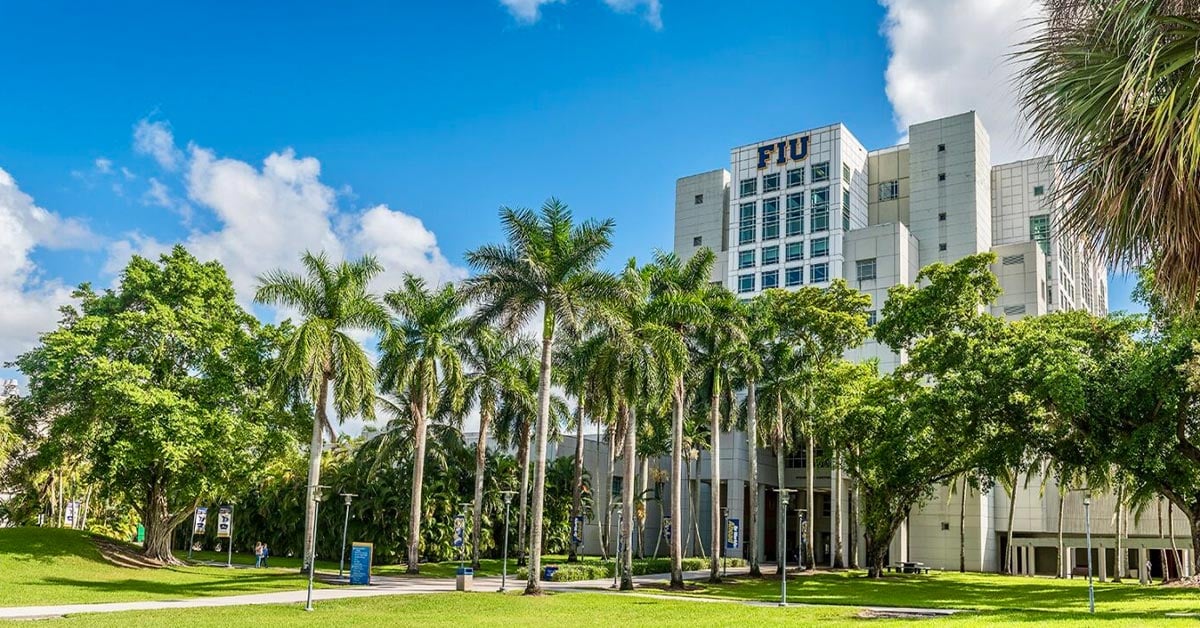
Florida International University College of Law, part of the dynamic and diverse FIU community, represents a modern and innovative approach to legal education. Florida International University College of Law was founded in 2000 and quickly established as a competitive law school recognized for its academic rigor, diversity, and commitment to public service. The FIU College of Law offers students the benefits of studying in a central metropolitan area that is a crossroads of international commerce, law, and culture located at 11200 SW 8th Street, Miami, Florida, within the Modesto A. Maidique Campus.
The acceptance rate at FIU College of Law is 22.6%. The acceptance rate reflects its competitive nature, drawing applicants who are academically talented, diverse, and driven to impact the legal profession. The law school’s admissions criteria, including 156 to 162 LSAT scores and 3.37 to 3.89 GPA requirements, are designed to identify students who are well-prepared for the challenges of law school and who contribute positively to the FIU community.
FIU College of Law boasts one of the highest bar exam passage rates in Florida, which is 86.7%, underscoring the effectiveness of its curriculum and the quality of its faculty. The impressive bar passage rate is a testament to the law school’s commitment to preparing students thoroughly for legal practice, including a strong emphasis on analysis, writing, and ethics.
The law degrees offered at FIU include the Juris Doctor (JD) program, with opportunities for students to participate in clinical programs, externships, and joint degrees. The college offers an LLM program for foreign-educated lawyers seeking to learn about the U.S. legal system or to specialize in areas such as Environmental Law, Human Rights Law, and International Law, among others. These programs are designed to meet the needs of a diverse student body with varied career goals.
Tuition fees at FIU College of Law are competitive, especially considering its public university status, making it a more affordable option than private law schools. In-state residents benefit from lower tuition rates, making FIU an attractive choice for Florida residents. However, the law school attracts out-of-state and international students with its vital programs and location. Its tuition fee for full-time is $21,115 (in-state) and $34,900 (out-of-state). The tuition fee for part-time is $15,936 (in-state) and $26,275 (out-of-state). Financial aid, scholarships, and other funding opportunities are available to help students finance their education.
Florida International University College of Law offers a comprehensive legal education with high bar passage rates, competitive admissions, and diverse academic programs. Its location in Miami, a hub for international law and commerce, provides an enriching backdrop for studying law. FIU College of Law is an excellent choice for students looking to make a meaningful impact in the legal profession with its commitment to excellence, diversity, and public service.
7. Barry University School Of Law
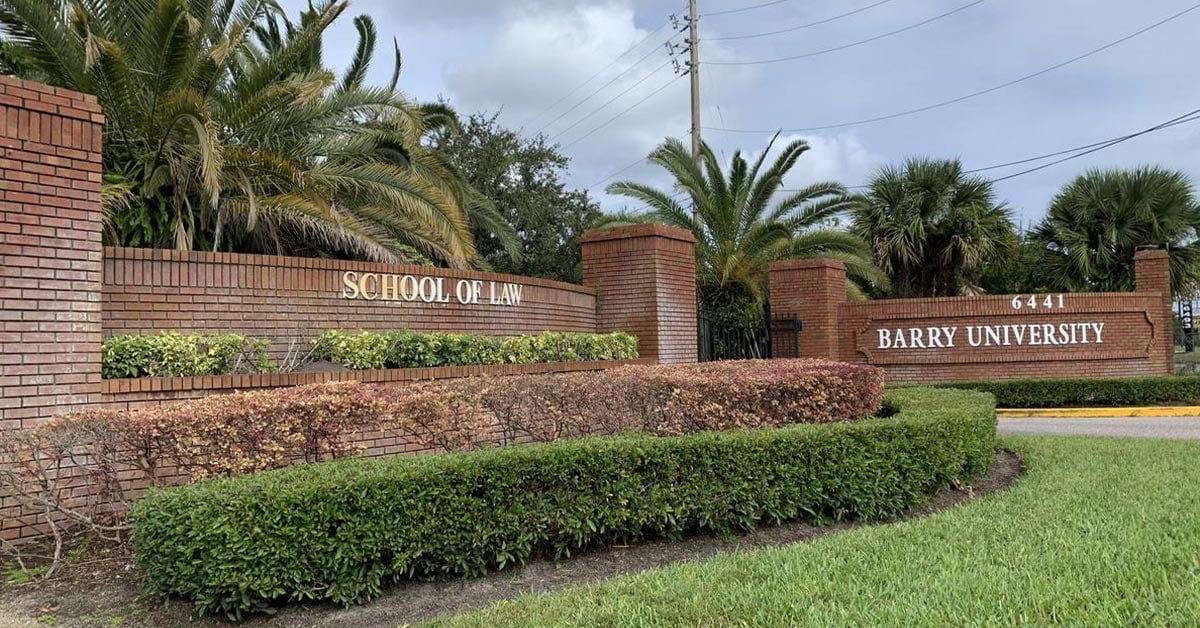
Barry University School of Law, situated in Orlando, Florida, is a private institution that prides itself on offering a personalized and values-centered legal education. Barry University School of Law has since developed a strong community focused on social justice, ethics, and public service. The law school’s campus is at 6441 East Colonial Drive, providing students access to one of Florida’s most vibrant cities, rich in legal and professional opportunities.
The acceptance rate at Barry University School of Law is 53.8%. It is relatively accessible compared to more competitive law schools, reflecting its commitment to providing opportunities for a broad range of students. The inclusivity aligns with the school’s mission to foster diversity, equity, and a supportive learning environment. The LSAT and GPA requirements are designed to ensure that students are prepared for the rigors of law school while recognizing the value of a holistic admissions process. The LSAT requirement of Barry University is 147 to 152 and a 2.89 to 3.5 GPA. The method considers the whole person, including life experiences and potential for contributing positively to the legal profession.
The bar exam passage rate of Barry University School of Law is 62.4%. Barry Law’s bar exam passage rate has seen improvement over the years, indicative of the school’s ongoing efforts to enhance its curriculum and academic support services. The progress underscores Barry’s dedication to preparing students to succeed on the bar exam and thrive in their future legal careers.
Barry University School of Law offers a Juris Doctor (JD) program with opportunities for practical experience through clinics and externships, allowing students to apply classroom knowledge to real-world legal challenges. Barry offers unique programs and certificates focusing on children’s and families’ law, environmental law, and trial advocacy, catering to students with specific interests and career goals.
Tuition fees at Barry Law reflect its status as a private institution, with the cost of attendance being a significant consideration for prospective students. Its tuition fee for full-time is $41,050 and $31,240 for part-time. Barry University School of Law strives to make legal education accessible through financial aid options, including scholarships, grants, and loans, to reduce the financial burden on students.
Barry University School of Law stands out for its inclusive admissions policy, commitment to social justice, and the personalized education it offers. Its focus on ethics and public service, combined with the practical training opportunities and supportive environment, makes it an appealing choice for students dedicated to creating a difference in the legal profession.
8. Florida State University College Of Law
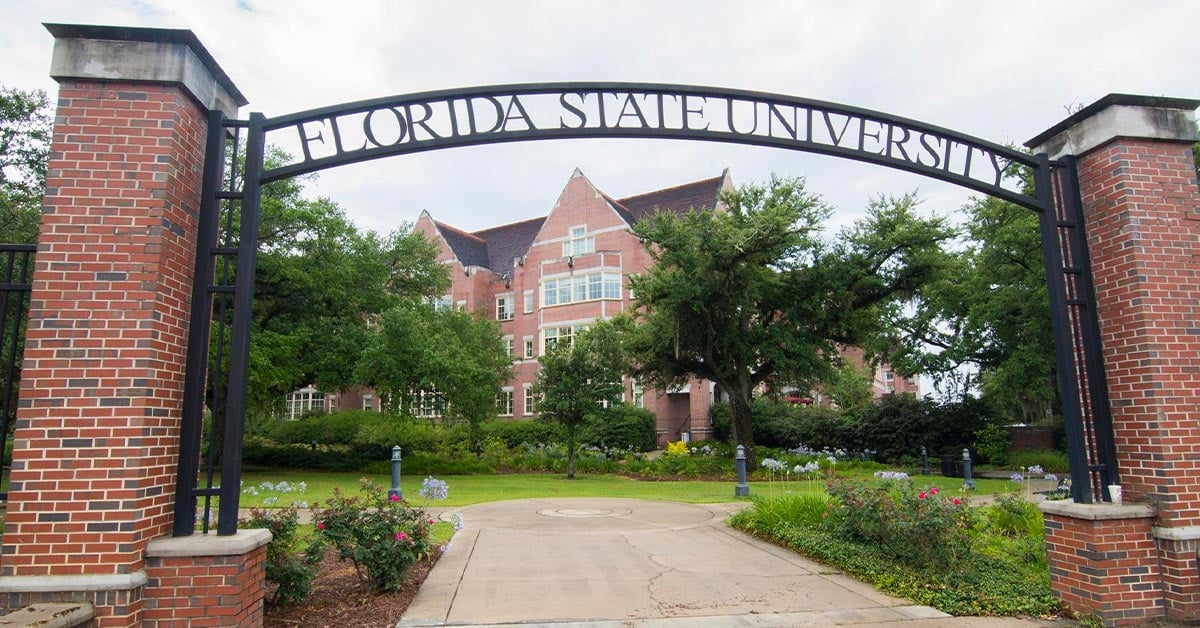
Florida State University College of Law, a leading institution within the state’s educational landscape, is renowned for its rigorous academic programs, distinguished faculty, and strong commitment to student success. The law school was established in 1966 in Tallahassee, Florida’s capital, at 425 W. Jefferson Street. The strategic location offers students unique access to state government, courts, and a plethora of legal institutions, facilitating unparalleled opportunities for internships, clerkships, and post-graduate employment within the public and private sectors.
The acceptance rate at Florida State University College of Law is competitive, which is 19.6%, reflecting its reputation and the high quality of education it provides. Prospective students are evaluated based on a holistic review process considering 159 to 166 LSAT scores, undergraduate 3.83 GPA, and other significant factors, including work experience, personal statements, and recommendations. The comprehensive approach ensures the admission of a diverse and talented student body prepared to meet the challenges of a legal education.
The acceptance rate at Florida State University College of Law is 74.2%. The law school boasts a high bar exam passage rate, consistently ranking among the top in Florida. The achievement underscores the effectiveness of FSU College of Law’s curriculum, which is designed to thoroughly prepare students for the bar exam and successful legal careers.
FSU College of Law offers a variety of law degrees, including the traditional Juris Doctor (JD) program. There are several joint degree options like the JD/MBA, JD/MPA (Master of Public Administration), and JD/MS (Master of Science), among others. The college provides LL.M. programs for U.S. and foreign-trained lawyers seeking to specialize in environmental and international law, catering to various professional interests and career goals.
Tuition fees at Florida State University College of Law are competitive, particularly for Florida residents, due to its status as a public institution. The law school is committed to making legal education accessible and offers various financial aid options, including scholarships and grants, to help students finance their studies. Out-of-state students find FSU attractive due to the quality of education relative to cost and the possibility of qualifying for in-state tuition rates after the first year. Its tuition fee for full-time is $20,693 (in-state) and $40,705 (out-of-state).
Florida State Law Schools stands out for its strategic location in Florida’s capital, competitive acceptance rate, high bar exam passage rates, diverse degree offerings, and relative affordability. Its focus on providing a comprehensive and practical legal education, combined with extensive opportunities for professional development, makes FSU College of Law a compelling choice for prospective law students.
9. Florida A&M University College Of Law
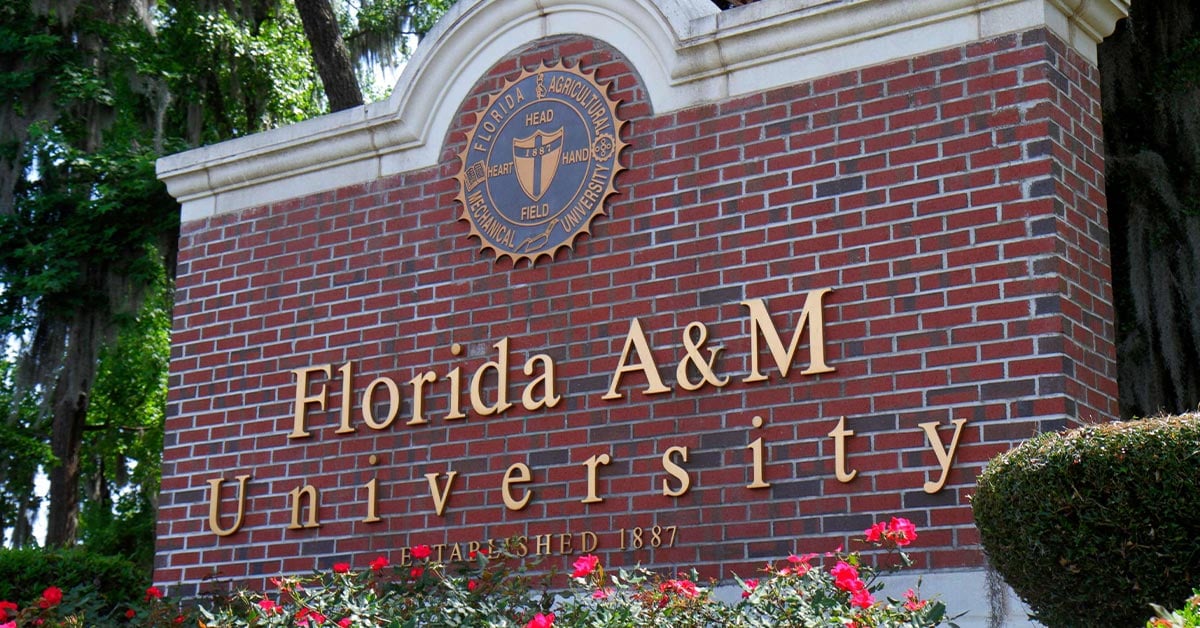
Florida A&M University College of Law, part of the historically Black university system, is celebrated for its dedication to diversity, excellence in legal education, and commitment to public service. The College of Law aims to provide accessible legal education to historically underrepresented groups and produce graduates equipped to contribute positively to the community. It was re-established in Orlando in 2002, after opening in Tallahassee in 1949 and closing in 1968. The campus is strategically located at 201 Beggs Avenue, Orlando, Florida, offering students access to a broad legal market in Central Florida.
The acceptance rate at Florida A&M University College of Law is designed to foster diversity and inclusion, providing opportunities for students from various backgrounds to pursue a career in law. Around 35.4% of applicants are accepted to the school each year. The law school values a holistic admissions process, considering LSAT scores and undergraduate GPAs, and emphasizes other factors such as personal statements, life experiences, and potential for leadership in the legal profession. Florida A&M has a median LSAT score of 150 and a median GPA of 3.42.
The bar exam passage rate of Florida A&M University College of Law is 56.3%. It has shown improvement over the years, reflecting the institution’s ongoing efforts to enhance its academic programs and student support services. The progress demonstrates the law school’s commitment to preparing its students to pass the bar exam and excel in their legal careers.
Florida A&M University College of Law offers the Juris Doctor (JD) program, with a curriculum emphasizing the skills and knowledge necessary for effective legal practice. The law school provides opportunities for experiential learning through clinics, externships, and moot court competitions, allowing students to gain practical experience while still in school.
Tuition fees at Florida A&M University College of Law are competitive, especially for in-state students, due to its public university status. The affordability is part of the law school’s mission to make legal education accessible to many students. The tuition fee for full-time is $13,816 (in-state) and $33,077 (out-state). Its tuition fee for a part-time program is 10,207 (in-state) and $24,332 (out-state). Financial aid, including scholarships and loans, is available to help students manage the cost of their education.
Florida A&M University College of Law stands out for its commitment to diversity, accessibility, and public service. The law school provides a valuable opportunity for students looking to make a difference through law practice. Its strategic location in Orlando focuses on comprehensive legal education and dedication to producing graduates ready to serve their communities.
10. Nova Southeastern University College Of Law
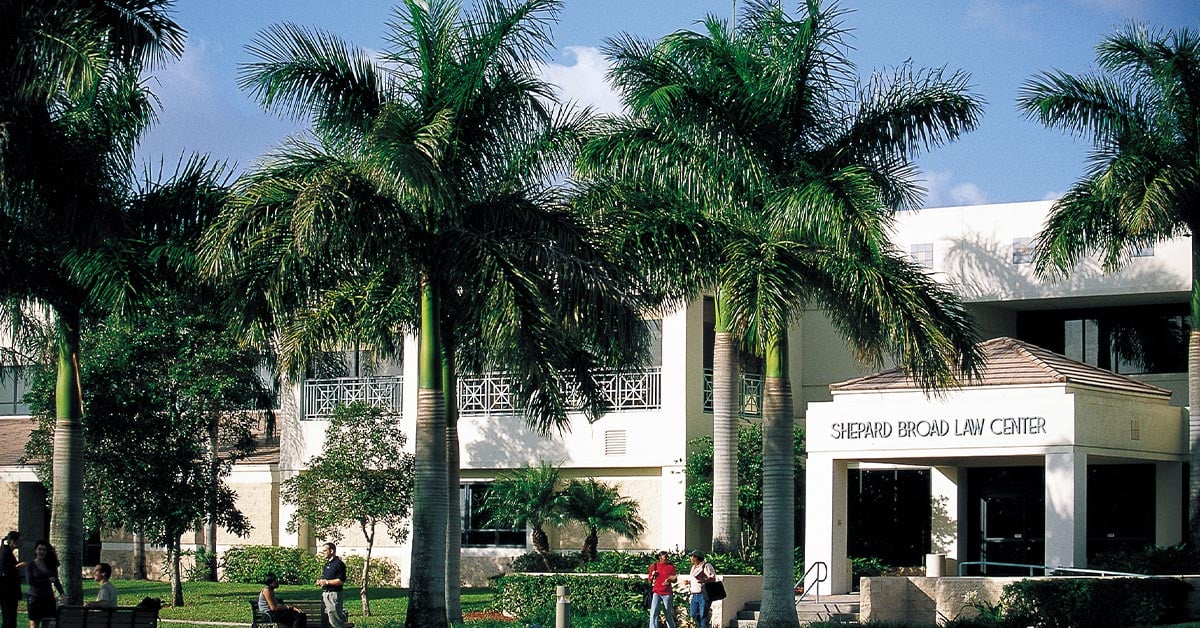
Nova Southeastern University Shepard Broad College of Law, located in Fort Lauderdale, Florida, is a dynamic institution committed to providing a comprehensive legal education tailored to the evolving needs of the legal profession. The law school is part of Nova Southeastern University, founded in 1974. It is a private, nonprofit university known for its innovative approach to education and research. The campus, situated at 3305 College Avenue, offers students the advantage of being in a central metropolitan area that serves as a hub for legal, financial, and international business activities.
The acceptance rate at Nova Southeastern University College of Law is competitive, reflecting its commitment to enrolling a diverse and academically talented student body. The law school seeks applicants who demonstrate academic solid while specific figures vary each year, as evidenced by their LSAT scores and undergraduate GPAs, along with a dedication to making a positive impact in the legal field. Applicants require an LSAT score of 153 and a GPA of 3.43 to access these programs.
Admission to law school requires meeting certain LSAT and GPA thresholds, which are set to ensure that students are well-prepared for the rigors of legal study. However, the admissions process is holistic, considering a range of factors beyond numerical indicators, including personal statements, work experience, extracurricular activities, and other achievements that speak to an applicant’s character and potential.
The bar exam passage rate of Nova Southeastern University College of Law graduates is a critical indicator of the school’s effectiveness in preparing students for legal practice. The university has an average first-time bar exam passage rate of 62.2%. The law school has implemented various programs and resources to enhance student performance on the bar exam, demonstrating its commitment to student success.
Nova Southeastern University College of Law offers a variety of law degrees. It includes the traditional Juris Doctor (JD) program, dual-degree options such as JD/MBA, and an array of LL.M. programs. These programs cater to U.S. and internationally trained lawyers looking to specialize in health law, business law, and dispute resolution. These programs reflect the law school’s dedication to providing flexible and specialized legal education that meets the needs of a diverse student population.
Tuition fees at Nova Southeastern University College of Law reflect its private institution status, with the cost of attendance being an essential consideration for prospective students. Its tuition fee for full-time is $46,197, and $35,051 for part-time. The law school strives to make legal education accessible through financial aid options, including scholarships, grants, and loans, to assist students in financing their studies.
Nova Southeastern University College of Law stands out for its innovative legal education programs, commitment to diversity and inclusion, and strategic location in South Florida. Its focus on preparing students for successful careers in law, coupled with a wide range of degree offerings and financial aid opportunities, makes it an attractive option for individuals seeking to enter the legal profession.
How To Choose A Law School In Florida?
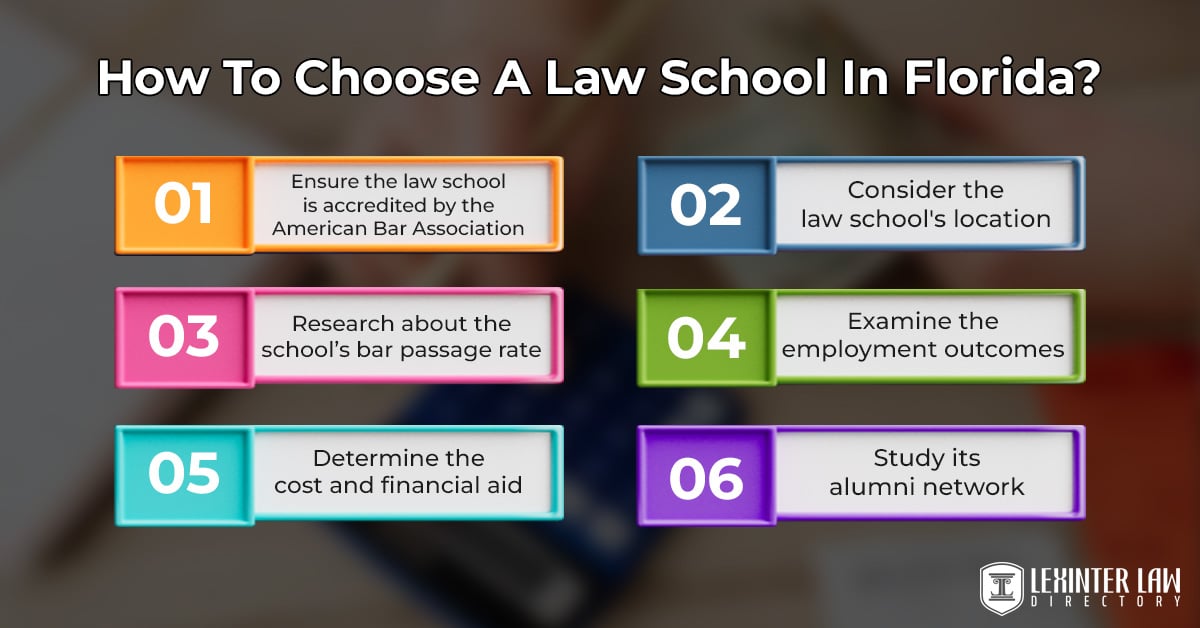
To choose a law school in Florida, follow the steps listed below.
- Ensure the law school is accredited by the American Bar Association (ABA). The accreditation is crucial for taking the bar exam and practicing law in the United States.
- Look for law schools that offer vital programs in areas of law an individual is interested in. Finding a school that excels in the area of interest provides a significant advantage, whether in environmental law, international law, or trial advocacy.
- Consider the law school’s location and its impact on the law career. Proximity to legal markets, courts, and potential job opportunities are beneficial. Evaluate the school’s network and connections within the legal community, as it is crucial for internships and employment after graduation.
- Research about the school’s bar passage rate. High bar passage rates indicate adequate academic preparation. Check the school’s bar exam passage rates to measure how well it prepares students for the bar exam.
- Examine the employment outcomes. Review graduates’ employment statistics to understand the school’s track record in placing students in legal jobs. Consider the types of employment, the sectors graduates work in, and the geographical locations where they find jobs.
- Research the faculty’s expertise and accomplishments. A law school with a distinguished faculty enhances the learning experience. Consider the resources available to students, such as legal clinics, libraries, and extracurricular activities.
- Determine the cost and financial aid. Analyze the total cost of attendance, including tuition, fees, and living expenses. Understand the financial aid options available, such as scholarships, grants, and loan programs, to help manage the cost of law school.
- Learn about the campus culture and student life. The law school experience extends beyond academics. Visit campuses to get a feel for the student body, campus culture, and the environment. Speaking with current students and alumni provides valuable insights.
- Analyze class size and student-to-faculty ratio. Smaller class sizes and a low student-to-faculty ratio facilitate more personalized attention and mentorship opportunities.
- Study its alumni network. A strong and active alumni network is a valuable resource throughout the career. Look into the law school’s alumni engagement and how it supports graduates’ professional development.
How Can Lexinter Help Choose A Law School In Florida?
Lexinter helps to choose a law school in Florida by assisting prospective law students in navigating the complex process of selecting a law school in Florida. Lexinter offers tools and information tailored to help users make informed decisions about their law school journey. These tools and information include detailed profiles of each law school in Florida, including crucial details such as academic programs, faculty expertise, specialization areas, tuition costs, financial aid opportunities, bar passage rates, and employment outcomes for graduates.
Lexinter allows prospective students to quickly evaluate and compare the offerings of different law schools in Florida by providing a centralized source of up-to-date and comparative data. Lexinter offers personalized recommendations based on the user’s preferences, career goals, and financial situation. Interactive features such as virtual tours, student and alumni reviews, and Q&A sessions with admissions counselors further aid decision-making.
Lexinter hosts webinars and workshops on topics relevant to prospective law students, such as navigating the law school application process, financing the legal education, and preparing for the bar exam. These resources help students choose the right law school and prepare them for the challenges and opportunities in their legal education and career.
Lexinter facilitates networking opportunities with current law students and legal professionals, offering insights into the real-world legal environment and what one to expect from a career in law post-graduation. The holistic approach to choosing a law school ensures that students are well-informed, confident in their decisions, and prepared to embark on their legal education journey.
A platform like Lexinter is an invaluable resource for anyone pursuing a law degree in Florida, providing guidance, information, and support at every step while the specific details about Lexinter’s offerings are speculative.
Academic Experience At Florida Law Schools
Florida law schools offer comprehensive academic programs designed to equip students with a solid legal foundation, opportunities for specialization, and practical experience through clinical programs and externships. Students begin with core subjects such as contracts, torts, civil procedure, criminal law, property, constitutional law, and legal research and writing. Specialization options are available in areas like environmental law, health law, and international law. Practical experience is emphasized through clinical programs, externships, and local internships, allowing students to apply their knowledge in real-world settings.
Core Courses And Foundational Curriculum
Florida law schools provide a comprehensive first-year curriculum designed to establish a solid legal foundation for students. The curriculum generally includes core courses such as contracts, torts, civil procedure, criminal law, property, constitutional law, and legal research and writing. The University of Florida Levin College of Law, for instance, requires first-year students to complete courses in torts, criminal law, contracts, legal research and writing, constitutional law, civil procedure, property, introduction to lawyering, and appellate advocacy. Florida International University College of Law’s first-year curriculum comprises contracts, constitutional law, torts, and legal skills & values in the fall semester. Civil Procedure, Criminal Law, Introduction to International and comparative law, property and legal skills, and Values II courses are included in the spring semester.
The foundational courses are designed to equip students with essential legal knowledge and analytical skills. The courses cover fundamental legal principles and introduce students to various areas of law, preparing them for more specialized courses in subsequent years. The inclusion of Legal Research and Writing courses emphasizes the development of critical research and communication skills necessary for effective legal practice. Students, by completing this rigorous first-year curriculum, build a strong base to support their future legal studies and professional endeavors.
Specialization Options (Environmental, Health, And International Law)
The specialization options in Florida Law Schools are listed below.
- Environmental Law: Florida law schools provide a concentration in Environmental and Land Use Law, combining real estate, land use, and environmental law studies. The program addresses issues like pollution, hazardous waste, and endangered species protection. Florida State University College of Law, for instance, offers a robust environmental law program ranked 19th nationally, with courses on climate change, land use regulation, and natural resource law.
- Health Law: Several law schools in Florida offer courses and externships related to healthcare regulation and policy. Nova Southeastern University’s College of Law, for example, offers a concentration in health law, providing in-depth knowledge of healthcare regulations, compliance, and policy. The program prepares students for roles in healthcare law and policy. The University of Miami School of Law, moreover, offers a Health Law area of focus, with courses and clinics addressing legal issues in healthcare delivery and policy.
- International Law: Florida law schools offer a concentration in International Law, including study abroad programs and international externships. Law programs specializing in international law prepare students for careers in global legal practice. Florida International University College of Law, for instance, provides an International and Comparative Law Program, offering courses and experiences in international legal systems and practices.
Clinical Programs, Externships, And Local Internship Opportunities
Florida law schools emphasize experiential learning through clinical programs, externships, and local internships, enabling students to apply theoretical knowledge in real-world legal settings. The University of Florida Levin College of Law, for instance, offers clinics and field placements where students provide legal services in environments such as the state attorney’s office, public defender’s office, or fully operational law clinics. The programs allow students to gain hands-on experience, develop professional skills, and build networks within the legal community, preparing them for successful legal careers. Stetson University College of Law guarantees that every student participates in a clinic or externship course during law school, offering over 300 opportunities annually.
Florida International University College of Law features a Clinical Program that allows students to apply legal principles in real-world contexts, enhancing their understanding of core legal and ethical concepts. The experiential learning opportunities are integral to the legal education provided by Florida law schools, ensuring that graduates are well-prepared for the demands of legal practice.
What Is The Best Law School In Florida For Criminal Lawyers?
Stetson University College of Law is the best law school in Florida for Criminal Lawyers. Determining the best law school in Florida for aspiring criminal lawyers involves evaluating institutions on their curricular strengths, faculty expertise, experiential learning opportunities, and the success of their graduates in criminal law. Stetson University College of Law stands out for its comprehensive approach to legal education, with a strong emphasis on trial advocacy and litigation skills. It makes it an excellent choice for individuals interested in pursuing careers as criminal lawyers.
Stetson University College of Law, located in Gulfport, near St. Petersburg, has earned national recognition for its advocacy program, consistently ranked among the best in the nation by U.S. News & World Report. The program focuses on the practical skills necessary for effective courtroom litigation, including trial preparation, courtroom procedure, and evidence presentation, which are crucial for success in criminal law. The college’s faculty includes seasoned practitioners and scholars in criminal law who bring real-world insights and expertise into the classroom.
Stetson offers a wealth of experiential learning opportunities, such as clinics and internships that allow students to work on actual cases under the supervision of experienced attorneys. These experiences are invaluable for students aiming to enter the field of criminal law, as they provide firsthand exposure to the intricacies of criminal cases and the justice system. Students engage in activities like the Public Defender Clinic, representing indigent clients in court, gaining practical skills and a deeper understanding of criminal defense work.
The law school’s network and location provide strategic advantages. Students have access to a large legal market with numerous opportunities for internships and employment in the public and private sectors in the Tampa Bay area. Stetson’s strong alumni network in criminal law offers students mentoring opportunities and professional connections that facilitate job placements and career advancement post-graduation.
Stetson University College of Law’s nationally recognized advocacy program, experienced faculty, comprehensive experiential learning opportunities, and strategic location make it the best law school in Florida for individuals aspiring to become criminal lawyers. Its focus on practical skills, along with the support and opportunities provided to its students, prepares graduates exceptionally well for the challenges and demands of a career in criminal law.
What Is The Best Law School In Florida For Environmental Lawyers?
The University of Florida Levin College of Law is the best law school in Florida for environmental lawyers. The distinction is mainly due to its comprehensive Environmental and Land Use Law Program, which offers a rich curriculum designed to prepare students for the complexities of environmental law, land use, and natural resources management. The program stands out for its depth and breadth, covering critical issues such as climate change, sustainable development, water rights, and conservation law, which are pivotal for environmental lawyers.
The University of Florida Levin College of Law provides students with numerous opportunities to engage in hands-on learning experiences through clinics, externships, and practical workshops essential for budding environmental lawyers. These experiential learning opportunities allow students to work on real-world environmental law issues, offering invaluable insights into the legal, regulatory, and policy challenges facing today’s environmental professionals. For example, the college’s Conservation Clinic lets students participate directly in ecological litigation, policy development, and international environmental advocacy, providing a practical foundation that theoretical coursework alone cannot offer.
The faculty associated with the Environmental and Land Use Law Program includes leading scholars and practitioners in the field, offering students mentorship and instruction from experts with firsthand experience in environmental law. Access to knowledgeable professionals enhances the learning experience and helps students build a network of beneficial contacts throughout their careers.
The University of Florida’s location further enriches its environmental law program. The college offers a living laboratory for studying the impact of environmental issues and their legal responses. It faces critical ecological challenges like rising sea levels, habitat destruction, and water pollution. The context provides an ideal backdrop for education and research in environmental law and policy, making the University of Florida Levin College of Law the best choice for aspiring environmental lawyers in Florida and beyond.
The combination of a robust curriculum, practical learning opportunities, expert faculty, and a relevant geographical location makes the University of Florida Levin College of Law the premier institution for students pursuing a career in environmental law.
What Is The Best Law School In Florida For Civil Lawyers?
The University of Miami School of Law is the best law school in Florida for civil lawyers. The prestigious institution is renowned for its comprehensive curriculum, which includes a wide range of courses and clinics specifically designed to prepare students for careers in civil law. The school’s Litigation Skills Program is noteworthy, offering one of the country’s most extensive practical legal training programs. The program equips students with the skills necessary to excel in civil litigation, from client interviewing and counseling to trial advocacy and negotiation.
The University of Miami School of Law offers specialized courses and seminars in various subfields of civil law, such as civil rights, employment law, family law, and personal injury, among others. These courses are taught by faculty members who are recognized experts in their fields, providing students with up-to-date knowledge and insights into civil law practice. The school’s clinics, such as the Children and Youth Law Clinic, the Human Rights Clinic, and the Immigration Clinic, allow students to work on real cases under the supervision of experienced attorneys. They gain hands-on experience invaluable for their future careers as civil lawyers.
Another significant advantage for aspiring civil lawyers attending the University of Miami School of Law is its location. A central legal and cultural hub, the school offers students unparalleled opportunities for networking, internships, and employment in one of the most dynamic legal markets in the United States. The city’s diverse population and wide range of legal needs provide a rich legal practice and advocacy environment, making it an ideal place for law students to start their careers.
The University of Miami School of Law’s Center for Ethics and Public Service and its Street Law program offer further opportunities for students to engage with the community and develop their legal skills through public education and service projects. These initiatives underscore the school’s commitment to using legal education to positively impact society, aligning with the values and goals of many aspiring civil lawyers.
The University of Miami School of Law stands out as the best choice for students aiming to become civil lawyers in Florida. The combination of a robust litigation skills program, a wide array of specialized courses, and hands-on clinical experiences. The advantages of its Miami location make it an exceptional environment for students to develop the knowledge and skills necessary for successful careers in civil law.
What Law School In Florida Has The Highest Acceptance Rate?
Barry University School of Law is the law school in Florida with the highest acceptance rate. Law schools with higher acceptance rates are seen as more accessible to a broader range of applicants. Barry University School of Law fits the description by offering opportunities to a diverse array of students, including individuals who bring unique life experiences or perspectives to the legal profession. The school’s approach to admissions reflects its commitment to inclusivity and diversity, providing access to legal education for students who demonstrate potential for success in law school and beyond, regardless of their undergraduate GPA or LSAT scores alone.
Barry’s mission emphasizes academic excellence and the development of lawyers committed to public service and justice. The broader view of candidates allows the school to consider various factors during the admissions process, contributing to its higher acceptance rate. Barry University School of Law provides robust support systems to ensure that all students, once admitted, have the resources and guidance to succeed in their legal studies and pass the bar examination.
Prospective students need to consider that while acceptance rates provide some insight into the selectivity of a law school, they must evaluate other factors. These factors include bar passage rates, employment outcomes, faculty expertise, and the school’s culture to make an informed decision about where to pursue their legal education. Barry University School of Law offers a supportive environment where students thrive, making it an attractive option for many aspiring lawyers.
How Much Does Law School In Florida cost?
Law school in Florida costs $15,000 to $50,000 and varies significantly depending on several factors, including whether the institution is public or private, the location within the state, and the associated living expenses. Tuition for law schools in Florida ranges from around $15,000 to $50,000 per academic year for full-time students. Public law schools offer lower tuition rates for in-state residents, making them more affordable than private law schools. However, the total cost of attendance, which includes tuition, fees, books, and living expenses, significantly increases the financial burden on students.
Cost factors influencing law school expenses in Florida include tuition fees, which are the primary expenses, followed by costs for books, supplies, housing, transportation, and personal expenses. Financial aid availability, including scholarships, grants, and loan programs, impacts the net cost for students.
The cheapest law school in Florida for in-state residents is Florida A&M University College of Law. Florida A&M offers one of the most affordable tuition rates among the law schools in the state with its commitment to providing accessible legal education, making it an attractive option for students sensitive to the cost of legal education.
The University of Miami School of Law, a private institution, is Florida’s most expensive law school. The University of Miami’s law school offers a prestigious legal education but at a higher cost, reflecting the quality of its programs, faculty, and facilities. The higher tuition fees at private institutions like the University of Miami are offset by the availability of financial aid packages, including scholarships that reduce the cost for eligible students.
The cost of attending law school in Florida varies widely based on the type of institution and its location. Prospective students must carefully consider these costs in light of their career goals and financial situation, exploring all available options for financial aid and scholarships to make their legal education more affordable.
Can You Become A Florida Lawyer Without Law School?
No, you cannot become a Florida lawyer without law school. The traditional path to becoming a lawyer requires earning a Juris Doctor (JD) degree from a law school accredited by the American Bar Association (ABA) in Florida or, in some cases, certified by the Florida Bar. Candidates must pass the Florida Bar Examination, which assesses the applicant’s understanding of legal principles and ability to apply them after law school.
The process ensures that all practicing attorneys in Florida have the legal knowledge, skills, and ethical understanding to provide competent legal representation. The requirement for formal legal education through an accredited law school is consistent with the standards set by most states in the U.S. and serves to protect the public. It maintains a high level of professionalism and expertise within the legal community.
Some states offer alternative pathways to legal practice, such as apprenticeships or reading the law under the supervision of a practicing attorney. Florida does not recognize these pathways as substitutes for completing an accredited law degree and passing the bar exam. Attending law school remains a prerequisite for becoming a licensed attorney in Florida.
What Are The Admission Requirements For Law Schools In Florida?
The admission requirements for law schools in Florida generally include a Bachelor’s degree from an accredited institution, a competitive LSAT or GRE score, and a strong undergraduate GPA. The University of Florida Levin College of Law, for instance, requires applicants to submit a LSAT score between 162 and 170 and undergraduate GPA score between 3.52 and 3.97. Florida A&M University College of Law requires a median LSAT score of 150 and median GPA of 3.42 for admission.
Applicants must provide letters of recommendation, a personal statement, and a resume detailing relevant experiences in addition to academic credentials. Several law schools, moreover, require a character and fitness assessment. Florida Levin College of Law, for instance, requires two letters of recommendation and a personal statement as part of the application. Florida State University Law, in addition, requires a personal statement and encourages the submission of up to three letters of recommendation. Prospective students must consult each law school’s admissions page for specific requirements and deadlines.
What Is The Easiest Law School To Get Into In Florida?
Barry University School of Law is the easiest law school to get into in Florida based on its relatively higher acceptance rate than other state law schools. Barry University School of Law does not detract from the quality of education provided but indicates a commitment to offering access to legal education for a broader range of students. It seeks to enroll students who demonstrate success in law school and the legal profession, considering various factors beyond LSAT scores and undergraduate GPAs. The holistic approach to admissions allows for considering applicants’ life experiences, work history, community service, and other personal achievements that indicate readiness for the rigors of legal study and practice.
Barry’s mission focuses on diversity, inclusion, and preparing graduates for ethical practice in the legal profession. The law school provides a supportive learning environment, with numerous resources aimed at helping students succeed academically and pass the bar exam. Barry University School of Law offers a promising option for students who are passionate about pursuing a career in law and looking for an accessible entry point into legal education in Florida. Prospective students must consider their educational and career goals carefully and view the admissions process as an opportunity to present a comprehensive picture of their abilities and aspirations.
What Is The Hardest Law Degree To Get?
The hardest law degree to get is the Juris Doctor (JD) due to its rigorous academic requirements, competitive admission process, and the intensive nature of the study. The Doctor of Judicial Science (SJD) or the Doctor of the Science of Law (JSD) is challenging when discussing postgraduate law degrees. The degree is aimed at individuals who have already completed their JD and, typically, a Master of Laws (LLM) degree and are interested in pursuing a career in academic research or teaching at the university level.
The SJD/JSD is the most advanced law degree, requiring candidates to produce a dissertation that makes a significant and original contribution to legal scholarship. The process involves years of independent research under the supervision of a faculty advisor, culminating in a dissertation that must be defended before a panel of experts. The SJD/JSD program admits a few highly qualified applicants each year, given its focus on original research and the expectation of contributing new knowledge to the field of law. It makes it the most complex law degree due to the intellectual rigor and dedication required and its highly selective admission process.
Candidates for the degree are expected to have an excellent academic record, strong research skills, and a clear vision for their research project. The time required to complete the degree, the depth of study, and the self-motivation and discipline needed to pursue such an advanced academic inquiry further contribute to its reputation as the most complex law degree to obtain.
What Are The Advantages Of Getting Into Law School In Florida?
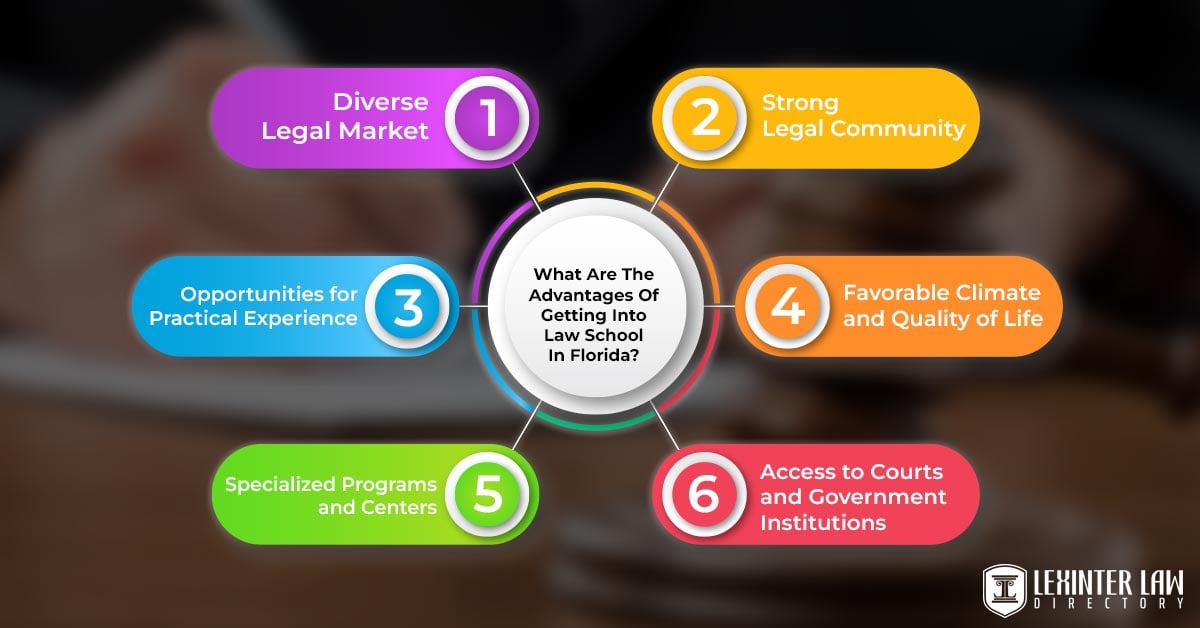
The advantages of getting into Law School in Florida are listed below.
- Diverse Legal Market: Florida has a large and diverse legal market encompassing many practice areas. Students find ample opportunities to explore different legal fields, from real estate and environmental law to international law and immigration. The diversity allows students to gain specialized knowledge and experience that are highly valuable in their careers.
- Strong Legal Community: Florida boasts a vibrant legal community with numerous bar associations, professional groups, and networking opportunities. Law students in Florida engage with the community through internships, mentorship programs, and events, helping them to build professional relationships and gain insights into various aspects of legal practice.
- Opportunities for Practical Experience: Many Florida law schools offer extensive clinical programs, externships, and internships that allow students to gain practical legal experience while in school. These opportunities provide hands-on experience in real-world legal settings, enhancing students’ legal skills and making them more attractive to future employers.
- Access to Courts and Government Institutions: Florida has several crucial federal state courts and numerous government agencies. Its access gives law students unique opportunities to observe the legal process, engage in public service, and even participate in high-profile cases through clinics and externships.
- Favorable Climate and Quality of Life: Florida’s warm climate and scenic beauty make it an attractive place to live beyond its academic and professional advantages. A positive and enriching law school experience is enhanced by the state’s diverse culture, recreational opportunities, and quality of life.
- Bar Passage and Employment Rates: The bar passage and employment rates for graduates are vital at many law schools in Florida. These schools offer a comprehensive bar exam preparation program and career services to assist students after graduation.
- Specialized Programs and Centers: Florida law schools feature specialized programs and research centers focusing on environmental law, international law, healthcare law, and elder law, reflecting the state’s unique legal and social issues. These specialized programs give students depth in their area of interest and distinguish them in the job market.
What Are The Disadvantages Of Getting Into Law School In Florida?
The disadvantages of getting into Law School in Florida are listed below.
- High Competition for Jobs: Florida’s vibrant legal market attracts many aspiring lawyers, resulting in high competition for legal positions, especially in popular areas like Miami, Tampa, and Orlando. Applicants for internships, clerkships, and jobs compete against many candidates.
- Cost of Living and Tuition: The cost of living in Florida is high, especially in major cities. Tuition fees for law schools in Florida are steep at private institutions. The financial burden necessitates significant student loans, leading to debt that impacts graduates for years.
- Hurricane Season and Weather Concerns: Florida’s susceptibility to hurricanes and extreme weather disrupts academic schedules, internships, and daily life. Students must prepare for it, even though it does not directly impact the quality of their legal education.
- Bar Passage Rates Vary: There is variability among institutions, while many Florida law schools boast strong bar passage rates. Prospective students must carefully consider each school’s bar passage rate as it indicates the quality of education and preparedness for the bar exam.
- Limited Geographic Mobility: Graduates of some Florida law schools find their job prospects more restricted to the state due to the regional reputation of their alma mater. Establishing connections and proving their qualifications are more difficult for students interested in practicing law in other states or internationally.
- Oversaturation in Certain Legal Markets: Several areas of legal practice in Florida are oversaturated, making it more difficult for new lawyers to find positions or build client bases. The oversaturation of the legal market forces lawyers to relocate or practice in less saturated states.
Student Life In Florida Law Schools
Student life at Florida law schools is enriched by diverse extracurricular activities, including participation in student organizations, law reviews, moot court competitions, and pro bono work. Several law schools offer student-run organizations and publications, reflecting the diversity of the student body. The opportunities foster professional development, community engagement, and a supportive academic environment.
Housing Options And Cost Of Living Considerations
Florida law schools offer a variety of housing options to accommodate students’ diverse needs and preferences. The University of Florida Levin College of Law, for instance, provides information on off-campus housing through its Off-Campus Life resource, which includes the Gator Guide to Off-Campus Life. The University of Miami School of Law similarly offers a Housing & Relocation Guide to assist students in finding suitable accommodations. The cost of living in Florida varies by location; for example, Miami’s housing costs are higher than the cost in Gainesville. Students must keep a budget of around $800- $1200 for living in Florida, which is higher compared to various states. Students must consider expenses such as rent, utilities, transportation, and food when planning their budgets. Several law schools provide estimated cost of attendance figures to help students prepare financially.
Balancing Academics And Extracurricular Activities
Balancing academics and extracurricular activities is crucial for law students to develop a well-rounded skill set. Engaging in student organizations, moot courts, law reviews, and pro bono work enhances practical skills and professional networks. The University of Florida Levin College of Law, for example, hosts over 40 active student organizations, including organizations focused on specific legal interests and community service. The University of Miami School of Law, similarly, offers more than 55 student-run organizations and publications, reflecting the diversity of the student body. Effective time management is essential to balance rigorous coursework with extracurricular commitments, ensuring academic success while gaining valuable experiences. Law students are encouraged to create structured schedules, prioritize tasks, and set realistic goals to manage their responsibilities efficiently.
Is Getting Into Law School In Florida Worth It?
Yes, getting into law school in Florida is worth it. Several compelling factors underscore the value and benefits of the significant career move in considering pursuing a legal education in Florida. The state’s legal market is notably diverse and dynamic, providing a rich array of career opportunities across various fields such as international law, environmental law, real estate, and immigration.
The evolving legal landscape offers a promising foundation for ambitious law graduates seeking professional careers. Florida’s law schools are recognized for their high-quality education, specialized programs, and ample opportunities for hands-on experience through clinics, externships, and moot court competitions. These educational experiences are crucial, equipping students with the necessary skills and knowledge to thrive in the competitive legal profession.
The vibrant legal community in Florida, coupled with active bar associations, presents numerous networking opportunities. Engaging with the community paves the way for valuable mentorship, internships, and job offers, fostering significant professional growth and career advancement. The lifestyle benefits of residing in Florida, including its warm climate, cultural diversity, and myriad recreational activities, contribute positively to the law school experience, making the state an attractive place for study and work.
Prospective law students must weigh these advantages against challenges. The competitive job market in Florida demands excellence and differentiation. The financial commitment to law school, encompassing tuition and associated costs, necessitates carefully evaluating the financial investment against expected returns, including earnings and career opportunities. Prospective students must explore scholarships, grants, and financial aid to alleviate the financial burden. Ensuring that a law school’s offerings align with one’s career goals is essential to selecting an institution with a strong bar exam preparation track record. Given the critical importance of passing the Florida Bar Exam for legal practice in the state.
A comprehensive assessment of these factors must inform the decision to attend law school in Florida. The opportunities for legal careers in the state are vast and varied, supported by quality education and a supportive professional community. Success in the endeavor requires passion and dedication, strategic planning, and consideration of the benefits and the challenges involved.
How Competitive Is The Job Market For Florida Law Graduates?
The job market for Florida law graduates is highly competitive, with strong placement rates for graduates from top-ranked schools but challenging conditions for graduates from lower-ranked institutions. Factors including school ranking, alumni networks, and the demand for legal professionals in specific regions influence the competitiveness of the job market. Higher-ranked schools like Florida Levin College of Law and Florida State University Law provide better employment outcomes due to their strong reputations, extensive alumni networks, and robust career services. Florida Levin College of Law, for instance, reported that 92.2% of its 2021 graduates were employed or enrolled in graduate studies within ten months of graduation. Florida International University College of Law’s Class of 2021 achieved a 95% employment rate, marking the highest in the college’s history. The institutions generally place graduates in prominent law firms, government positions, and judicial clerkships within Florida and nationally, which improves job prospects for graduates in a competitive market.
Graduates from lower-ranked or regional law schools, however, find the job market more challenging, competing for positions within smaller firms, local government roles, or alternative legal paths. The average employment score for Florida law schools is 75.6%, indicating that approximately three-quarters of graduates secure full-time, long-term legal positions. Factors such as specialization, work experience, and geographic flexibility impact job prospects as well.
Is It Hard To Get Into Law School In Florida?
Yes, it is hard to get into law school in Florida. Getting into law school in Florida is challenging, but the difficulty level varies significantly among the different law schools in the state. The competitiveness of admission depends on several factors, including the law school’s reputation, its ranking, the applicant pool’s size and quality in a given year, and the specific admission criteria of the school.
Florida’s top-ranked law schools, such as the University of Florida Levin College of Law and Florida State University College of Law, have more stringent admission criteria, requiring higher LSAT scores and undergraduate GPAs. These schools attract many applicants, including many with impressive academic and professional backgrounds, making the admission process highly competitive.
Other law schools in Florida have more accessible admission standards, providing opportunities for a broader range of applicants. These schools emphasize holistic review processes, considering factors beyond numerical credentials, such as work experience, personal statements, and letters of recommendation, which influence the competitiveness of admissions.
Prospective law students must research each school’s admission statistics and requirements to gauge their acceptance chances and tailor their applications accordingly. Applicants who carefully prepare their applications and align their credentials with their target schools’ profiles improve their chances of admission, while getting into law school in Florida is challenging, especially at the more competitive institutions.
Are Florida Law Schools Better Than Law Schools In Georgia?
No, Florida law schools are not better than law schools in Georgia. Florida and Georgia boast reputable law schools that offer high-quality legal education, each with its unique advantages and areas of specialization.
The comparison between law schools in the two states must consider several factors, including academic programs, faculty expertise, campus facilities, extracurricular opportunities, bar passage rates, employment outcomes, and the culture and environment of the institution. For example, the University of Florida Levin College of Law and Florida State University College of Law are well-regarded for their comprehensive legal programs and strong bar passage rates. Emory University School of Law and the University of Georgia School of Law are highly respected in Georgia, offering rigorous academic training, excellent faculty, and strong employment outcomes for graduates.
The best choice between Florida and law schools in Georgia depends on the applicant’s specific needs and goals. Some students prioritize the location due to personal or professional ties, while others focus on specialization areas where certain schools have established expertise, such as environmental law in Florida or corporate law at Emory.
Prospective law students must research and compare law schools based on criteria that align with their career aspirations and personal circumstances. Attending law school open houses, speaking with current students and alumni, and reviewing independent law school rankings and employment statistics provide valuable insights to help make an informed decision.

